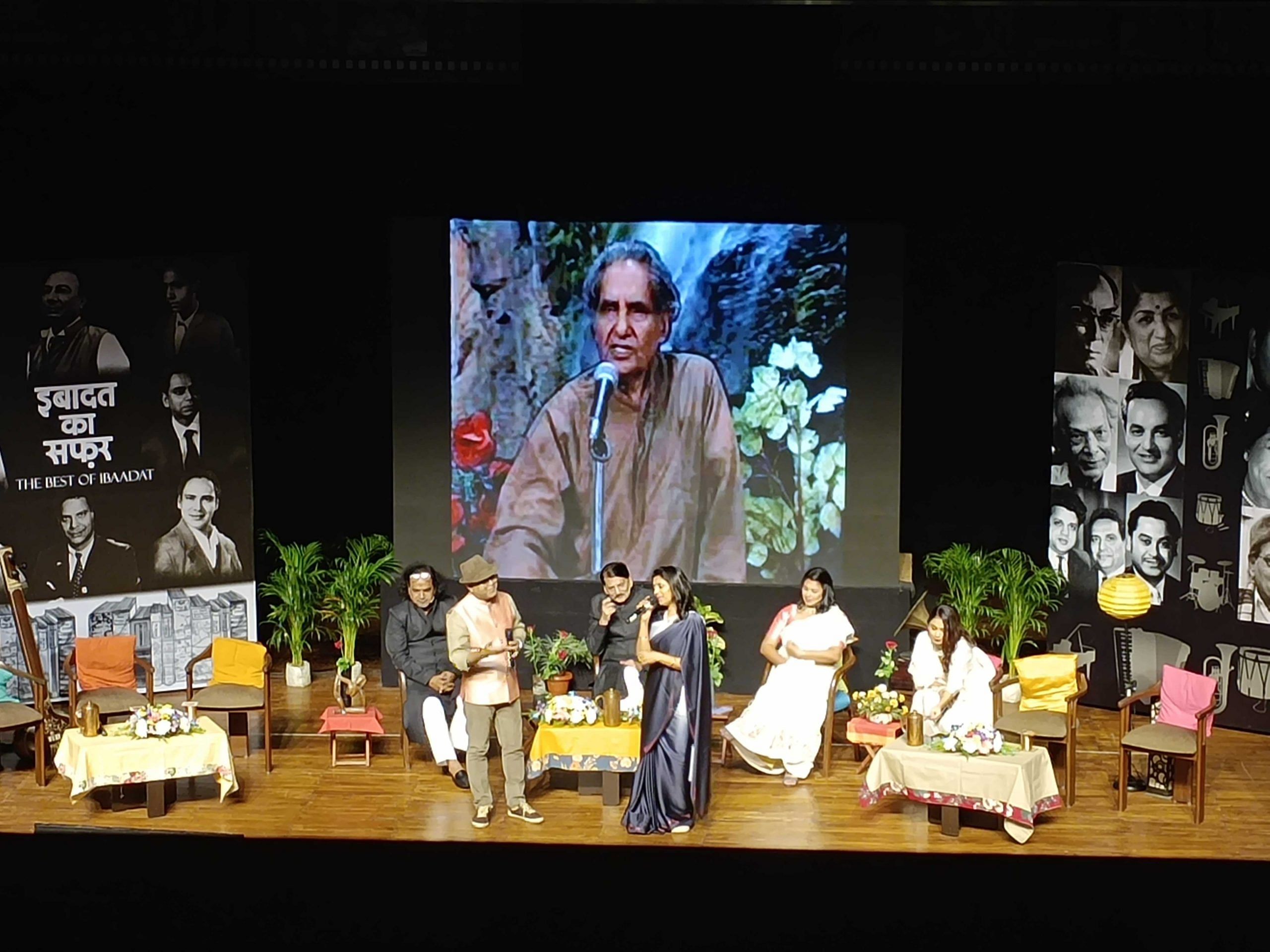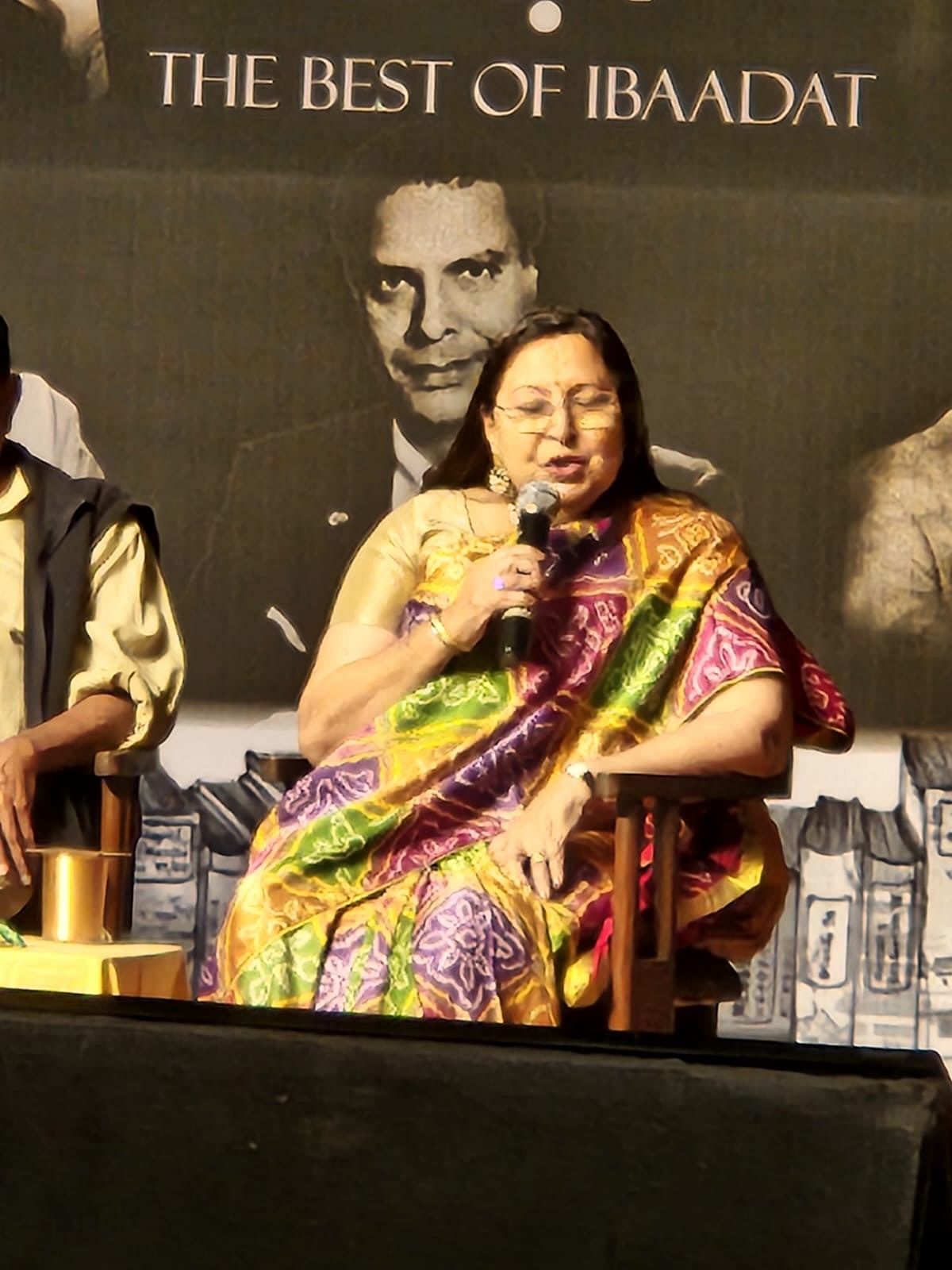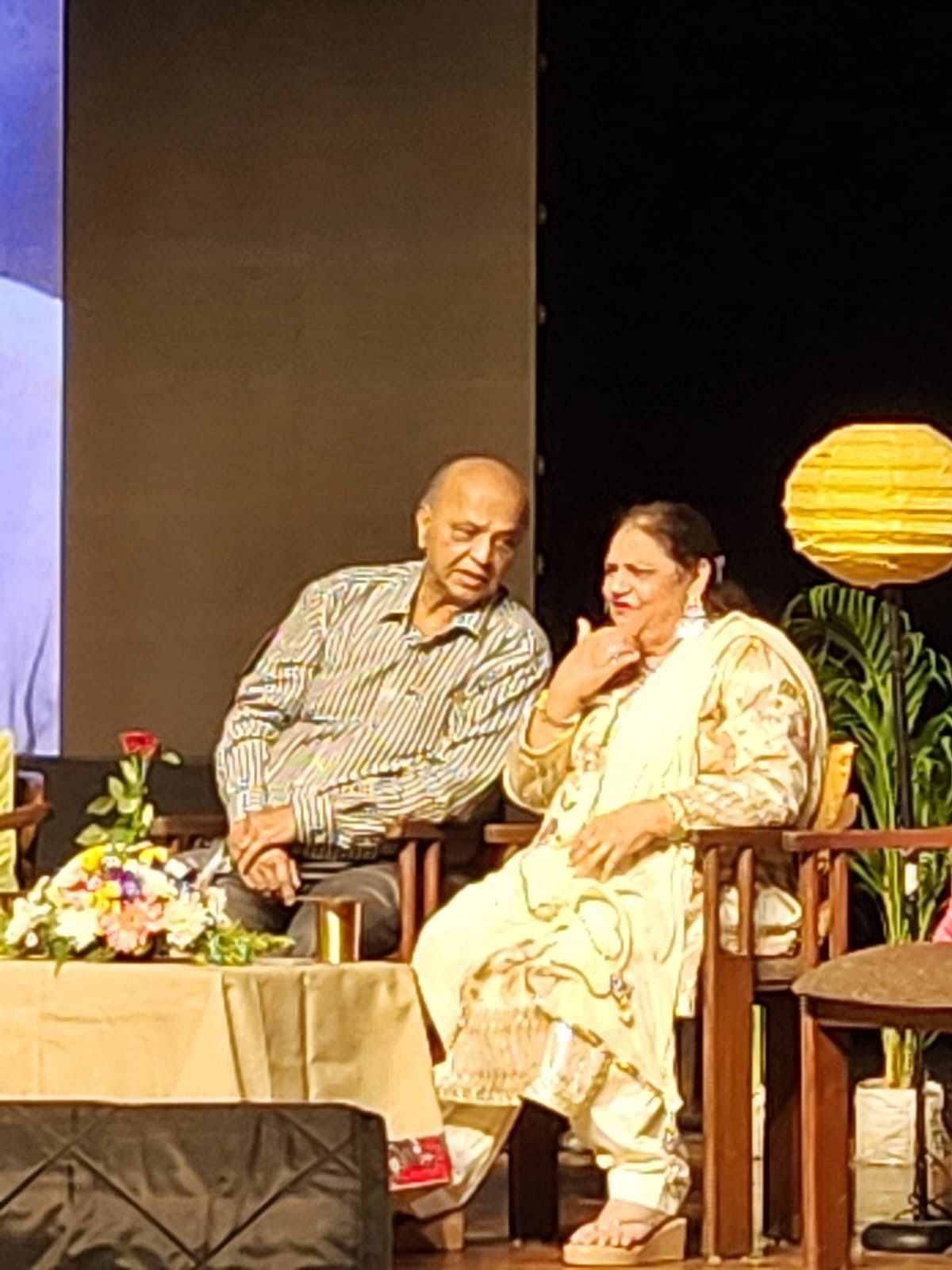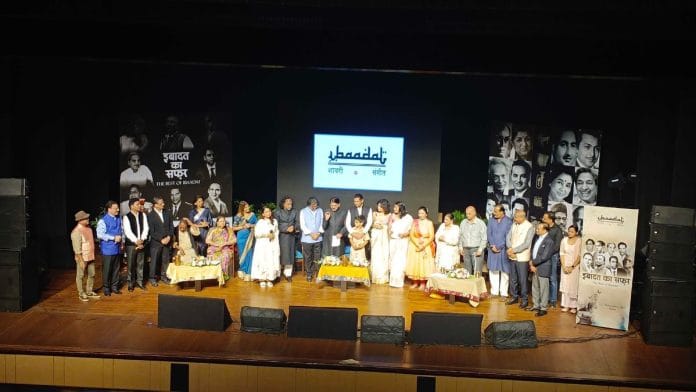New Delhi: Songs, stories, laughter, and a nostalgia-filled audience often broke into a chorus as the renditions of their beloved lyricists were performed. That’s how the anniversary celebration of the Ibaadat Foundation began and ended on Tuesday evening in Delhi, which saw hundreds of fans brave the pollution to keep a date with the unforgettable lyrics of Majrooh Sultanpuri, Madan Mohan, Shailendra and others from the golden era.
The stage, set up to resemble a dining hall, was not only filled with artists but also with the family members of the lyricists whose lives were being celebrated — Saba Sultanpuri, daughter of Majrooh Sultanpuri; Sangeeta Gupta, daughter of Madan Mohan; Dinesh Shailendra, son of Shailendra; Rajesh Duggal, son of Rajinder Krishan and many more.
“Not only does our format set us apart, but the hard work that goes into it makes the show unlike anything else. From old archives and online research to reaching out to the people who were connected to the poet, every effort brings the show to life,” said Prithvi Haldea, founder of the Ibaadat Foundation, an initiative celebrating the lyricists of a bygone era.
The spell-binding performance titled Ibaadat ka Safar at the Kamani Auditorium weaved together captivating tales of lyricists’ lives, the journey behind the timeless songs, some unforgettable moments, and, of course, poetry.
It’s a 10-year-old effort by the foundation to pay tribute to the film industry’s much-ignored army of poets and songwriters. Movie histories and celebrations are mostly obsessed with stars and singers and have notoriously paid less to lyricists and pushed them into the background. In the past decade, the nostalgia industry has grown and there is a hunger for information about the bygone era.
In recent years, more books, plays and performances have tapped into this appetite.

It’s a housefull
The innovative approach of the show was evident from the very first performance, with its “no orchestra” rule. Instead, the team collaborated with music directors to create high-quality, pre-recorded tracks, allowing the singers to focus on delivering powerful renditions of the songs without the distraction of an orchestra.
“An orchestra would have distracted the audience from our storytelling, and it would also have made the stage look overcrowded,” said Haldea.
The entire auditorium, packed with an engaged audience, was constantly clapping, laughing, or singing along with the artists, their eyes closed in deep connection with the performance.
What began as a humble experiment with just 250 attendees nearly a decade ago has now grown into a phenomenon where the organisers have to turn fans away due to housefull shows.
“People call and message us for tickets, and we have to say no because we get short of seats,” said Prithvi Haldea.
On Tuesday evening, the audience enjoyed the stories as songs such as Mere Mehboob Tujhe Meri Muhabbat ki kasam (Mere Mehboob, 1963) and Jab Pyaar kiya to darna kya (Mughal-E-Azam, 1960) both written by Shakeel Badayuni; Raat Akeli Hai Bujh Gaye Die (Jewel Thief, 1967) by Majrooh Sultanpuri; Tere mere sapne (Guide, 1965) by Shailendra echoed nearly six decades after they were first penned.
Also read: 300 letters on the walls of a Delhi exhibition. All written to art critic Keshav Malik
Forgetting the unforgettable
Haldea had a vague idea about what he wished to do for the lyricists. But he wanted to confirm his hypothesis. To test people’s knowledge of lyricists, he conducted an informal survey among 100 people, asking them about the song Chaudhavin Ka Chand. While most could recall the melody and the singer, Mohammed Rafi, only two people out of 100 could name the lyricist, Shakeel Badayuni.
The abysmal apathy toward Bollywood lyricists even among the die-hard fans of the songs shocked Haldea.
Film songs became popular largely because of their lyrics, yet people often forget the lyricists behind them. As a lover of poetry, Haldea wished to undo this injustice. In 2011, he founded an organisation dedicated to celebrating lyricists, their work, and their lives through a musical show.
“Television, radio, or social media, everybody talks about film heroes-heroines, singers and music directors. No one ever felt that the lyricist should also be introduced,” said Haldea, the founder of Ibaadat, and founder of Prime Database, which offers all information about capital markets. While cassettes and CDs with ‘hits of Dev Anand’ or ‘Kishore Kumar hits’ or ‘Hits of RD Burman’ were popular in the 1980s and the 1990s, lyricists didn’t get the same spot in the hall of fame.

Introducing the legends
A group of friends from diverse backgrounds came on one platform – all tied together by their shared love for Bollywood songs and shayari. Haldea himself had made a name and built a successful business in the financial market world.
Dinesh Kothari, who is based out of Dubai, is a Chartered Accountant. Fond of Hindi poetry and Urdu shayari, Kothari has been providing support to poets. Akhil Gupta is vice chairman of Bharti Enterprises, India’s second-largest telecom operator. Also associated with the initiative are Vishnu Dusad, co-founder and MD, Nucleus Software, and Haldea’s friend and lawyer Vijay Singh Yadav.
“I want people to understand that these are not just songs, but poetry in lyrical form. Lyrics are the soul of songs, and songs can’t survive without a soul,” said Haldea.
But Haldea had a rocky start to the endeavour. The very first door he knocked on was slammed shut.
The first-ever show of Ibaadat was an experiment, a risky endeavour to create a new format where poetry, music, and storytelling come together. And he hoped the family of the lyricist Majrooh Sultanpuri would be elated about the planned celebration of his life.
“Majrooh Sultanpuri was a difficult subject to choose, some have already done shows on him,” recalled Haldea.
He delved into archives and traveled across the country to uncover books and stories about lyricists. However, it wasn’t that easy.
At first, Majrooh Sultanpuri’s son was hostile. He just didn’t wish to cooperate. He even questioned who had given Haldea the right to share his father’s story. But Haldea persisted, explaining the show’s concept and emphasising respect for writers.
“I called him up, and I still remember that conversation. He got angry at me. He said, who gave you the right to show my father? Who are you? Majrooh belongs to me, he said,” Haldea recalled the first phone conversation. “I said, no sir, Majrooh belongs to the world. And you should be happy that I’m doing a show, a non-commercial show, non-ticketed, non-sponsored, out of my love for poetry. You should be happy that I’m doing it. He said please don’t do it. I’m warning you.”
Eventually, Majrooh’s daughter, Saba, agreed to meet him. Their conversation led to a valuable collaboration, with Saba joining the first Ibadat show as a guest, adding an emotional and authentic touch to the performance.

“I still remember the first call by Haldea and the next day he visited me from Delhi to Mumbai just to know about my father,” said Saba Sultanpuri.
That’s how the first show of Ibaadat premiered at the India Islamic Cultural Centre in New Delhi on 12 November 2011. It was a simple, intimate gathering of just 250 people in the audience. It was a success. The group had tapped into an unexplored catchment.
“At first, the audiences were mostly 40 plus. Now, young people are also coming to our programs. We are not targeting only old people and taking them into the old era. Our goal is that lyricists who have done good work should get recognition,” added Haldea.
Also read: ‘The Last Courtesan’ is a saga of guns, gangs, ghazals. Author didn’t want it to be a movie
‘Rahe na rahe hum’
One of the most touching aspects of Ibaadat’s journey is the emotional bond it has forged with its audience. Over the years, even as the audience size grew larger, the intimacy of shared Bollywood nostalgia grew deeper.
“After the shows, some people are so moved that they can’t even speak, but you can see tears in their eyes,” recalled singer Supriya Joshi.
The Ibadat website features a feedback section where messages are attached to the details of each show. “Words cannot describe how I felt during and after the show. A great effort… I am truly overwhelmed”; “Unforgettable evening”; “This was quite easily the most magical music event we have ever experienced” are just some of the heartfelt messages shared by the audience.
Each program of Ibaadat is based on nearly a year of research, including reading the poet’s work and speaking with their family and friends. Each show features 16-18 of the poet’s best songs, performed by singers. For example, the process of creating a show about a lyricist like Majrooh Sultanpuri involved gathering not just his famous songs and writings, but also lesser-known works and personal stories that can connect with the audiences.
“There are stories about these lyricists that you will not even find on Google searches. Prithvi ji has done such good research on the lyricists, we present anecdotes and information about their lives, which he has collected from their family members. He meets them and writes all the information into the script. And it takes him months to write one script,” added Joshi.
The two-and-a-half-hour–long musical that made the audiences travel back in time, had a quintessential ending underlying the classics these golden era lyricists have left back. The song was ‘Rahen Na Rahen Hum’ written by Majrooh Sultanipuri.
(Edited by Anurag Chaubey)






